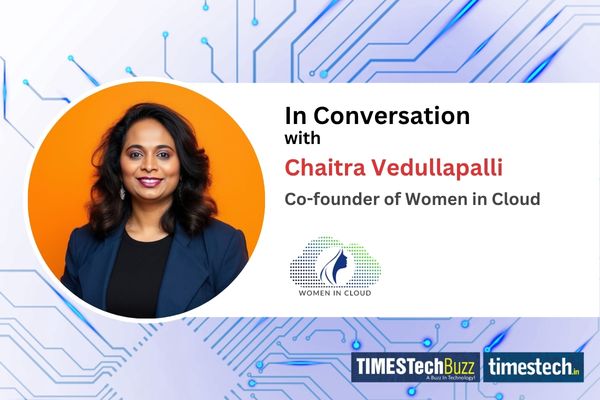In an interview with TimesTech, Chaitra Vedullapalli, Co-founder of Women in Cloud, shares how her 4P Cosell GTM Method is empowering businesses to scale with tech giants. She also discusses unlocking $500M+ in opportunities for women entrepreneurs, the future of cloud marketplaces, and how her work in GTM, filmmaking, and venture funding aligns to build an inclusive, digitally fluent, and economically accessible global ecosystem.
Read the full interview here:
TimesTech: You’ve developed the 4P Cosell GTM Method that’s transformed how businesses scale with tech giants. Can you walk us through how this model was conceptualized and its impact on cloud-based enterprises?
Chaitra: The 4P Cosell GTM Method was born out of necessity. I saw hundreds of partners struggling to scale in Microsoft’s Cosell ecosystem—not for lack of innovation, but due to gaps in GTM readiness and cohesion. The core challenge was fragmentation: product teams created offers in isolation; promotions were outsourced without ecosystem context; publicity was an afterthought; and partnerships rarely focused on impactful joint colaunches. This led to wasted time, money, and effort.
To solve this, I developed the 4P GTM Method: Product Offer, Promotions, Partnerships, Publicity—a simple, repeatable framework enabling companies to drive visibility, generate demand, and convert it into predictable revenue through an integrated, quarterly GTM gameplan.
An inspiring example: when Women in Cloud partnered with Microsoft for a Guinness World Record in AI skilling, we applied 4P to orchestrate the campaign preparing over 1,000 AI-certified individuals, generating global publicity, and building trusted Cosell partnerships. That is the power of structured, human-centered GTM.
TimesTech: Meylah and Women in Cloud have played pivotal roles in democratizing economic access. What are some key strategies you’ve implemented to unlock \$500 million in economic opportunities for women entrepreneurs globally?
Chaitra: Democratizing economic access starts with enabling change—by guiding people through four stages: pre-contextualizing the change, embracing a new identity, taking deliberate action, and sustaining the transformation.
At Meylah and Women in Cloud, every program is designed with this architecture. For founders, we run accelerators that help them build cosell GTM plans and drive revenue through cloud marketplaces. For career professionals, we offer Cloud & AI skilling scholarships paired with preparation toolkits, gamified action boards, and peer networks for reinforcement.
We also create high-engagement experiences—like Guinness World Record challenges, red carpet headshot events, and leadership visibility platforms—to foster confidence and public presence.
Every initiative is crafted to help individuals and businesses adopt new identities as tech and ecosystem leaders—and maintain that growth. This holistic approach has helped us unlock $500 million+ in economic opportunities—and it’s only the beginning.
TimesTech: As someone who’s worked with tech leaders like Microsoft and Oracle, how do you see cloud marketplaces evolving in the next five years, particularly for emerging tech like AI and cybersecurity?
Chaitra: Cloud marketplaces are becoming the default commerce engine for enterprise tech. In the next five years, we’ll see:
- AI agents and copilots sold and transacted through marketplaces.
- Cybersecurity-as-a-service offerings scaled through marketplaces to address enterprise risk.
- More industry-specific marketplaces (healthcare, finance, sustainability) driving tailored solutions.
- Procurement and compliance automation making marketplaces attractive to CFOs not just CIOs.
For emerging tech companies, marketplace GTM will no longer be optional—it will be strategic infrastructure.
TimesTech: You’ve been honored with numerous awards and have served on several influential boards. How do you balance these leadership roles, and what does effective governance look like to you in a digital-first world?
Chaitra: I approach leadership roles with an ecosystem mindset. Every board I serve on must align with my mission: unlocking economic access and scaling impact. I prioritize quality over quantity and look for boards where my expertise in GTM, AI, and ecosystem building adds unique value.
Effective governance today requires:
- Digital fluency—boards must understand AI, cloud, cybersecurity at a strategic level.
- Inclusive decision-making—diverse perspectives mitigate risk and drive innovation.
- Trust and agility—leaders must foster trust while enabling faster, more informed decisions.
TimesTech: From engineering student in Bengaluru to global tech influencer, your journey is remarkable. What were some defining moments that shaped your mission to empower women in technology and leadership?
Chaitra: Several moments stand out:
- Early in my career, I often found myself the only woman in the room—sometimes the only woman of color. That instilled a deep curious to understand what it happens and what you can do about it from the place of you are.
- At Microsoft, seeing the power of democratizing access—and realizing women entrepreneurs were not benefiting equally—sparked the idea for Women in Cloud.
- Producing the ICONS documentary was another defining moment—it showed me the power of storytelling to drive systemic change.
Each of these moments reinforced my mission: to build an economy where we can fully participate and lead.
TimesTech: Your work spans GTM strategy, filmmaking, and venture funding. How do these seemingly diverse interests align, and how do they contribute to your broader vision for inclusive economic development?
Chaitra: They are all different levers of influence toward the same goal: democratizing economic access.
- GTM strategy helps companies drive revenue and scale through trusted ecosystems.
- Filmmaking and media shape culture and create emotional resonance, which accelerates adoption and trust.
- Venture funding ensures that underrepresented entrepreneurs have the capital to participate in—and shape—the future economy.
Together, these levers allow me to build systemic pathways to access, influence both hearts and markets, and scale inclusive impact globally.


















